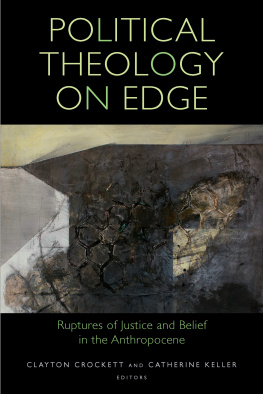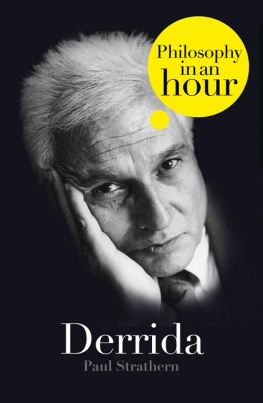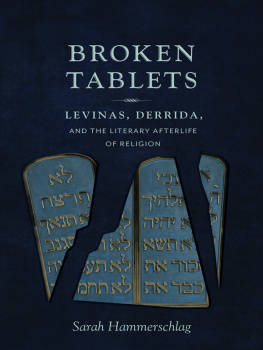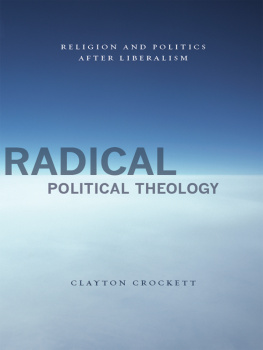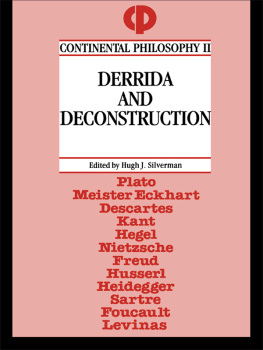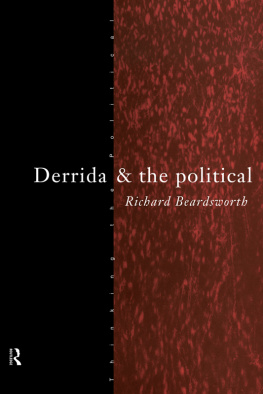Crockett Clayton - Derrida after the end of writing: political theology and new materialism
Here you can read online Crockett Clayton - Derrida after the end of writing: political theology and new materialism full text of the book (entire story) in english for free. Download pdf and epub, get meaning, cover and reviews about this ebook. City: New York, year: 2018;2018, publisher: Fordham University Press, genre: Religion. Description of the work, (preface) as well as reviews are available. Best literature library LitArk.com created for fans of good reading and offers a wide selection of genres:
Romance novel
Science fiction
Adventure
Detective
Science
History
Home and family
Prose
Art
Politics
Computer
Non-fiction
Religion
Business
Children
Humor
Choose a favorite category and find really read worthwhile books. Enjoy immersion in the world of imagination, feel the emotions of the characters or learn something new for yourself, make an fascinating discovery.

- Book:Derrida after the end of writing: political theology and new materialism
- Author:
- Publisher:Fordham University Press
- Genre:
- Year:2018;2018
- City:New York
- Rating:3 / 5
- Favourites:Add to favourites
- Your mark:
- 60
- 1
- 2
- 3
- 4
- 5
Derrida after the end of writing: political theology and new materialism: summary, description and annotation
We offer to read an annotation, description, summary or preface (depends on what the author of the book "Derrida after the end of writing: political theology and new materialism" wrote himself). If you haven't found the necessary information about the book — write in the comments, we will try to find it.
Derrida after the end of writing: political theology and new materialism — read online for free the complete book (whole text) full work
Below is the text of the book, divided by pages. System saving the place of the last page read, allows you to conveniently read the book "Derrida after the end of writing: political theology and new materialism" online for free, without having to search again every time where you left off. Put a bookmark, and you can go to the page where you finished reading at any time.
Font size:
Interval:
Bookmark:
Derrida after the End of Writing
Series Board
James Bernauer
Drucilla Cornell
Thomas R. Flynn
Kevin Hart
Richard Kearney
Jean-Luc Marion
Adriaan Peperzak
Thomas Sheehan
Hent de Vries
Merold Westphal
Michael Zimmerman
John D. Caputo, series editor
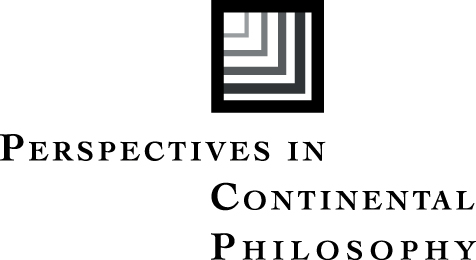

Copyright 2018 Fordham University Press
All rights reserved. No part of this publication may be reproduced, stored in a retrieval system, or transmitted in any form or by any meanselectronic, mechanical, photocopy, recording, or any otherexcept for brief quotations in printed reviews, without the prior permission of the publisher.
Fordham University Press has no responsibility for the persistence or accuracy of URLs for external or third-party Internet websites referred to in this publication and does not guarantee that any content on such websites is, or will remain, accurate or appropriate.
Fordham University Press also publishes its books in a variety of electronic formats. Some content that appears in print may not be available in electronic books.
Visit us online at www.fordhampress.com.
Library of Congress Cataloging-in-Publication Data
Names: Crockett, Clayton, 1969 author.
Title: Derrida after the end of writing : political theology and new materialism / Clayton Crockett.
Description: First edition. | New York, NY : Fordham University Press, 2017. | Series: Perspectives in Continental philosophy | Includes bibliographical references and index.
Identifiers: LCCN 2017003972 | ISBN 9780823277834 (cloth : alk. paper) | ISBN 9780823277841 (pbk. : alk. paper)
Subjects: LCSH: Derrida, Jacques. | Religion. | Political sciencePhilosophy.
Classification: LCC B2430.D484 C76 2017 | DDC 194dc23
LC record available at https://lccn.loc.gov/2017003972
Printed in the United States of America
20191854321
First edition
for Jack, for Jacques and Everything After
Contents
Derrida after the End of Writing
This is a book about Jacques Derrida. In it I try to open up some new ways to read his philosophy by focusing on his emphasis on religion and politics toward the end of his career, and then using this to develop a more materialist reading of Derrida. I have had a lot of inspiration for this project, including the work of John D. Caputo, Catherine Malabou, and Karen Barad. My contention is that Derridas thought remains important; it cannot be relegated to the dust-bin of some latetwentieth-century linguistic idealism and subjectivist constructivism that just plays with language. This has always been the wrong understanding of Derrida, from its earliest incarnation, but this bad reading has been reasserted with some of the newer theoretical currents in the twenty-first, such as Speculative Realism, New Materialism, and Object-Oriented-Ontology, not to mention the political Lacanianism of Slavoj iek and Alain Badiou.
Here I do claim that something changes in Derridas work, but this shift cannot be described precisely as a turn. Using Malabous idea of a motor scheme, an organizing image of thought or root metaphor that expresses the broadest information of a time period or epoch, I suggest that Derridas philosophy works mostly within the motor scheme of writing. At a certain point, however, during the late 1980s and early 1990s, this cultural-intellectual-technological scheme of writing evolves into a motor scheme that Malabou describes as one of plasticity. For Derrida, the works of the 1990s and early 2000s are different because they are written in some ways as a response to and expression of this change of scheme. In effect, the concerns of ethics, politics, and religion emerge into the foreground as writing becomes more and more backgrounded. Michael Naas gets at the heart of what animates Derridas work with the title of his important book, Miracle and Machine , because Derrida is explicitly more engaged with the tension between belief and responsibility as a kind of singular, miraculous living event and the repetition of a kind of machinic technicity that exposes this life to a form of death from the beginning.
We struggle to read Derrida because something is different and we are not sure what it is. I think that Malabous notion of a motor scheme and her distinction between writing and plasticity as motor schemes are important heuristics for helping us understand Derrida. I am less invested in as sharp a distinction as Malabou makes with this change in scheme, but I am using it to explore what it would mean to read Derrida beyond the scheme of writing. Malabou collapses the two sides of Derridas later work, the responsibility of the living being and the mechanical repetition that gives death, into her understanding of neurobiological form, which is characterized by plasticity. For his part, Derrida increasingly adopts a biological metaphor of auto-immunity to make sense of religion and politics, most significantly in his explicit essay on religion, Faith and Knowledge. This notion of auto-immunity exceeds any simple or even extended sense of writing.
I claim, then, that something changes in Derridas later work that is not simply a turn, but a more background context of and for his work, which is well articulated with Malabous idea of a motor scheme. There is a kind of transition from an intellectual motor scheme based on writing in a broad sense to one based on what Derrida sometimes characterizes in terms of the machinic, teletechnology, or technoscience, and Malabou calls plasticity. Arthur Bradley calls this situation an originary technicity in his book on technology from Marx to Derrida. This transformation in the 1980s and 1990s changes how Derrida writes and how he is read in his later work. Caputo is one of the first American readers to really appreciate this, although he presents his interpretation more in terms of religion than in terms of plasticity or technicity. But I think that many of the arguments about Derridas engagements with religion and with politics in his later work are tied to this shift in one way or another. Its not that Derrida changes his philosophy; he is clear about how consistent his interests, ideas, and themes are across his career. Rather, something has changed in the background or the cultural and intellectual context of how we read him.
My interpretation, however, is not just about getting the correct exegesis of Derridas works. It also consists of an intervention concerned with developing a constructive understanding of Derrida that shows his continuing relevance for contemporary philosophical discussions, including those concerning New Materialism, speculative realism, ideas about ecology and the natural sciences, and object-oriented ontology. That is, within a new intellectual context in the twenty-first century, we need new resources and new ways of seeing how his thought is important and relevant beyond simple polemics (whether pro or anti). Here is where I constructively engage Derrida with Jacques Lacan, to a certain extent, and also with Caputos radical theology, with Malabous biological materialism, and with Barads understanding of quantum physics as a materialist hauntology.
To read and think about Derrida beyond the motor scheme of writing is to engage with the religious and political significance of his later work. I want to take this one step further and argue that working through these political and religious themes opens the possibility for a more materialist interpretation of Derrida. Derrida certainly kept a critical distance from materialism; he does not use this term in a positive sense. At the same time, I think that the non-reductionist materialism expressed in terms of New Materialism offers important tools to understand Derrida. In some ways, I am appropriating Derrida as a new materialist, but I dont think that deconstruction proscribes such an entanglement.
Next pageFont size:
Interval:
Bookmark:
Similar books «Derrida after the end of writing: political theology and new materialism»
Look at similar books to Derrida after the end of writing: political theology and new materialism. We have selected literature similar in name and meaning in the hope of providing readers with more options to find new, interesting, not yet read works.
Discussion, reviews of the book Derrida after the end of writing: political theology and new materialism and just readers' own opinions. Leave your comments, write what you think about the work, its meaning or the main characters. Specify what exactly you liked and what you didn't like, and why you think so.

